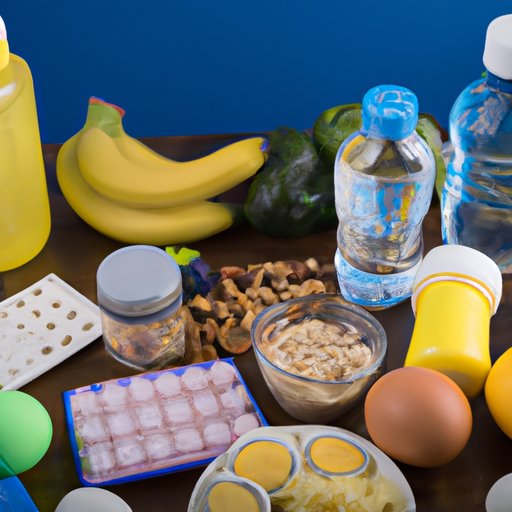Introduction
Marathons are long-distance running events that require months of dedicated training and preparation. In order to perform at their peak, runners must not only practice regularly, but also ensure they are eating the right foods to support their body’s needs. A marathoner’s diet should include a range of healthy, nutrient-rich foods that will provide them with the energy they need to complete the race. This article will explore what to eat the day before a marathon to fuel your run and optimize performance.
A Nutritionist’s Guide to Eating for a Marathon: What to Eat the Day Before
Carbohydrates are the primary fuel source for athletes during exercise, so it is important to ensure you are getting enough carbohydrates in your diet. According to a 2019 study published in the journal Nutrients, athletes should strive to consume 6 to 10 grams of carbohydrates per kilogram of body weight per day in order to properly fuel their runs and improve performance. Additionally, adequate amounts of protein, fat, vitamins, and minerals are essential for muscle repair, energy production, and overall health.
In the days leading up to the marathon, focus on consuming nutrient-dense foods such as fruits, vegetables, whole grains, lean proteins, and healthy fats. These foods will provide the necessary energy, vitamins, and minerals needed to perform optimally on race day. Examples of pre-marathon meals include oatmeal with nuts and berries, grilled chicken and steamed vegetables, and a salad with quinoa and avocado.
The Ultimate Pre-Marathon Meal Plan: What to Eat the Day Before
On the day before the race, aim to eat smaller, more frequent meals throughout the day. This will help prevent stomach discomfort during the race and help maintain steady energy levels. For breakfast, try a bowl of oatmeal with banana and walnuts, or scrambled eggs with spinach and toast. For lunch, opt for a wrap with hummus and roasted vegetables, or a salmon salad. As for snacks, reach for a handful of nuts, a piece of fruit, or some plain yogurt with granola.
It is also important to time your meals correctly. Aim to have your last meal at least four hours before the race. This will give your body time to digest the food and avoid cramps or nausea during the race. Be sure to drink plenty of water throughout the day to stay hydrated.
Pre-Marathon Eating: What You Should Be Eating the Day Before
Eating well before a marathon is beneficial not only for physical performance, but also mental clarity. According to a 2016 study published in the journal Frontiers in Psychology, eating a healthy diet helps to improve cognitive function and reduces stress. Eating a variety of nutritious foods will help you stay alert and focused during the race and can also reduce inflammation and boost immune system function.
In addition to eating healthy, there are certain foods you should avoid before the race. Foods high in fat and fiber take longer to digest and can cause digestive issues during the race. Avoid fried foods, processed foods, and foods high in sugar. Also, limit your caffeine intake to one cup of coffee or tea before the race.
The Best Foods to Fuel Your Run: What to Eat the Day Before a Marathon
High-carbohydrate foods are key to fueling your run. Choose complex carbohydrates such as whole grains, potatoes, beans, and legumes. These foods will provide sustained energy and help keep your blood sugar levels stable. Try to incorporate some of these foods into your meals the day before the race.
It is also important to get enough protein in your diet. Protein helps to build and repair muscles, so it is important to consume enough to promote muscle recovery after the race. Focus on eating lean proteins such as fish, poultry, eggs, and tofu.
The Marathoner’s Diet: What to Eat the Day Before the Race
In addition to eating the right foods, staying hydrated is essential for optimal performance. Aim to drink at least eight glasses of water throughout the day, and avoid alcohol and sugary drinks. Sports drinks can be beneficial for replenishing electrolytes lost through sweat.
Finally, consider taking a multivitamin or other supplement to ensure you are getting all the necessary nutrients. Vitamins B, C, and D are important for energy production and immune system support. Omega-3 fatty acids can also help reduce inflammation and protect against muscle soreness after the race.
Conclusion
Proper nutrition is essential for any runner looking to perform their best in a marathon. Eating the right foods the day before the race will help provide the energy needed to complete the race. Focus on eating nutrient-dense foods such as fruits, vegetables, whole grains, and lean proteins. Additionally, make sure to stay hydrated throughout the day, and consider taking a multivitamin or other supplement. With the right nutrition plan in place, you will be well on your way to achieving your best performance in the marathon.
(Note: Is this article not meeting your expectations? Do you have knowledge or insights to share? Unlock new opportunities and expand your reach by joining our authors team. Click Registration to join us and share your expertise with our readers.)
